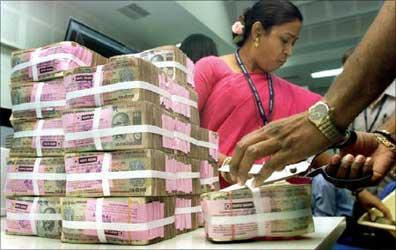
A study by the Reserve Bank of India has mooted the idea of floating the rupee as an alternative global currency, but asked the government to carefully assess the pros and cons of such action, as it may increase volatility in the forex markets.
The idea was mooted after the global financial crisis and weakening of the American dollar triggered a debate over an alternative global currency.
The study titled, Internationalisation of Currency: The case of the Indian Rupee and the Chinese Renminbi, also said it is quite unlikely that the dollar will lose its predominance as the global reserve currency in the foreseeable future.
"The current crisis has, however, thrown open the debate on the need for a new global reserve currency in case the US economy fails to make a significant turnaround and the weakness of the US dollar persists," it added.
The issue of a new global reserve currency is attracting the attention of policy makers all over the world in recent times.
The issue has assumed significance for Asian central banks, including the RBI, which have invested a significant proportion of their reserves in dollar denominated assets.
Any sharp depreciation in the value of the dollar would entail significant losses to these central banks.
The moot question, however, is which currency is capable of replacing the US dollar in the medium to long-term.
Click NEXT to know more...
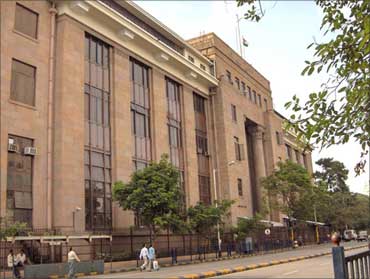
The recommendations were made in a study, authored by RBI director Rajiv Ranjan and assistant advisor Anand Prakash, which said that among emerging market currencies, the yuan and the rupee are natural contenders for international currency status.
This is on account of increasing economic prowess of these countries and their ability to withstand the adverse impact of the global financial crisis with relatively greater ease.
With enormous foreign exchange reserves, China India, and Russia do pull a lot of weight in the global economy today. The weakness of the dollar has added to this pressure significantly.
The study notes that Chinese authorities have taken a number of steps to bring about greater internationalisation of renminbi which is already visible in transactions with its neighbouring economies.
"There are, however, problems associated with internationalisation of the rupee as it could increase volatility of its exchange rate," the study said.
Outlining the difficulty in positioning the Indian currency as a global reserve, the study said that unlike China, which has a large current account surplus, India has a significant trade and current account deficit.
Click NEXT to know more...
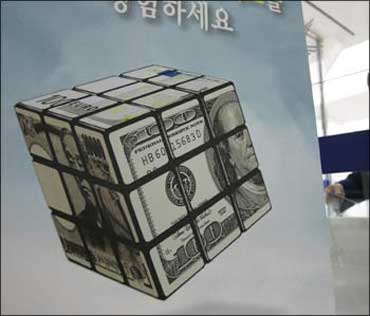
Current account balance broadly relates to exports and imports of goods and services and investment income from global trade.
Withdrawal of short-term funds and portfolio investments by non-residents could also be a major potential risk of internationalisation of the Indian rupee, it added.
"The Indian rupee is rarely being used for invoicing of international trade," the study pointed out.
The study argues that India needs to proactively take steps to increase the role of the rupee in the region.
They conclude this after noting that significant strength exhibited by the Indian rupee in the recent months and continued good performance of the Indian economy have raised the issue of greater internationalisation of the Indian rupee.
India's has so far followed a calibrated approach towards capital account liberalisation. India, at present, does not permit rupee to be officially used for international transactions except those with Nepal and Bhutan though there are indications of Indian rupee gaining acceptability in other countries.
Click NEXT to know more...
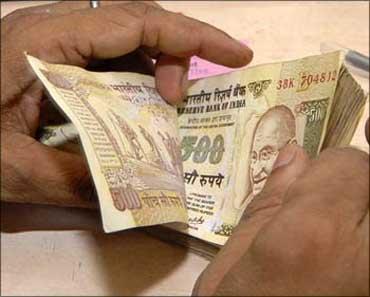
Internationalisation of rupee would also require India to make the rupee fully convertible. This means that rupee could be exchanged against other currencies freely.
There are currently curbs on such convertibility, so far as capital accounts like stocks are concerned.
India accounts for a very small proportion of the total foreign exchange market turnover in the world as compared to other countries.
BIS Triennial Central Bank Survey data for 2007 shows that India's daily average share in the total foreign exchange market turnover is 0.9 per cent as compared to 34.1 per cent for the UK and 16.6 per cent for the USA.
However, India's share in total foreign exchange market turnover has been slowly but continuously increasing. India's share has increased from 0.1 per cent of the total foreign exchange market turnover in 1998 to 0.2 per cent in 2001 to 0.3 per cent in 2004 to the current 0.9 per cent.
The share of Indian Rupee in total currency turnover is also very small. Moreover, in case of the Indian rupee, spot transaction accounts for major part of currency turnover (42.6 per cent), while in case of both euro and dollar, the foreign exchange turnover is highly concentrated in foreign exchange swaps.
The Central Bank of Nepal, Nepal Rastra Bank, also holds Government of India Treasury Bills.
Click NEXT to know more...
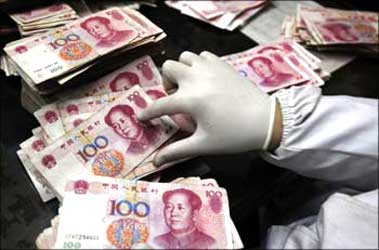
The renminbi is far from ready to achieve reserve currency status at the moment.
Progress towards renminbi internationalisation depends not only on China's own cost-and-benefit calculation but also on China's share in the world economy, confidence of global markets and well functioning financial market.
Before the renminbi becomes fully convertible, the offshore renminbi market will have to be in place.
Apart from economic aspects, political elements are equally important for the renminbi internationalisation, say the authors.
The renminbi is likely to become a regional currency because of China's expanding trade links before it gains acceptance as an international reserve currency, the study concludes.
It may be mentioned in this context that China is actively pushing the idea of setting up a regional monetary fund on the base of ASEAN+3 and also making a strong case for Asian Currency Unit (ACU).
According to some economists at Shanghai University, internationalisation of RMB is a three-step process.
First, RMB will emerge as a common currency of 'Greater China' including mainland China, Hong Kong and Taiwan; second, it will become a major component of an ACU and finally, acquire a global profile.